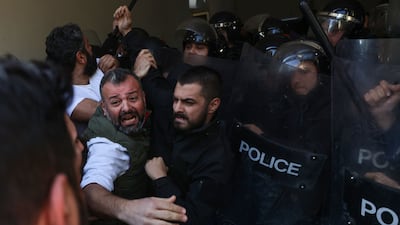Angry protesters sought to break into Lebanon's Justice Palace on Thursday as they demonstrated against yet another judicial blockage in the investigation into the deadly Beirut port blast.
The explosion in 2020 killed more than 220 people in Lebanon's capital, injured thousands and destroyed many parts of the city.
The protest came a day after Lebanon's chief prosecutor ordered the release of all those detained in connection with the blast and filed charges against Tarek Bitar, the judge leading the investigation.
The demonstrators, including family members of the victims, had gathered to show support for Mr Bitar and to register their protest as the country's leading judges later cancelled a meeting to discuss the fate of the blast probe.
“We want to send a message to the world that the law has died in Lebanon,” Mireille Khoury, whose son Elias was one of the victims of the blast, told The National.
MP Michel Moawad said: "The message is very clear, we will not accept impunity. We want accountability." In 11 failed rounds in parliament to elect Lebanon's next president, Mr Moawad has consistently received the most votes from MPs — but he remains well short of the threshold required to become the new head of state.
As has happened before, tensions boiled over as some protesters clashed with security forces, throwing rocks and banging the gates to one of the entrances to the justice palace. They succeeded in opening one of the gates and dragged out two riot policemen who were beaten and kicked by a few of the protesters before being escorted back inside.
A member of parliament, Waddah Sadek, said he was assaulted by bodyguards of the Justice Minister after a meeting with the latter inside the Justice Palace.
Mr Bitar had on Monday resumed the investigation into the port blast after 13 months of delays and legal challenges. He charged a number of officials — including chief prosecutor Ghassan Oueidat, as well as the heads of two of Lebanon’s security agencies, the prime minister at the time of the blast Hassan Diab and other judicial officials.
But on Tuesday, he was told by Mr Oueidat that the highly politicised investigation remained suspended.

The legal dispute underlines the uphill challenge in the push for justice, the lack of which has exacerbated the pain felt by the families of the victims.
Ms Khoury said she was "out of words" to describe the developments on Wednesday. "We were shocked. No one can imagine what has happened."
Ms Khoury and victims' relatives are calling for international support to bring those responsible for the blast to justice.
"We are a lawless country now. Please help us. Will you [let] this horrendous crime go unpunished, unnoticed, just like this?" she said.
Mr Moawad said: "We, from the beginning, said we wanted the help and support of international justice on this issue."
He said the explosion was "a crime against Lebanon" for which the perpetrators must be held accountable.
Mr Bitar has the backing of many families of the victims, but he has also faced severe criticism from his opponents, including some of Lebanon’s most powerful factions. Among those who have called for his dismissal is Hezbollah, the Iran-backed armed group and political party that has accused the judge of biased and of being influenced by the US.
The explosion took place after a massive stock of ammonium nitrate — which had been stored at the port for years — caught fire. No explanation has been given for why it was there.
The explosion is seen as a damning symptom of decades of mismanagement and corruption in Lebanon, which have also been blamed for a devastating economic crisis that has plunged much of the country into poverty.











